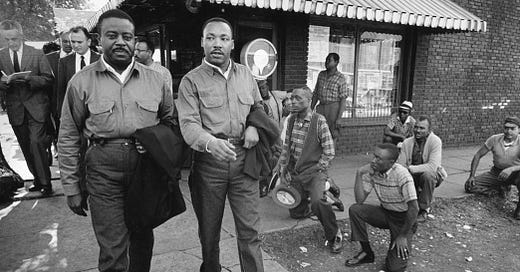MLK's Radical Economic Vision
His views of the poor, money, and capitalism are integral to his civil rights legacy
If Dr. King's radical economic vision resonates with you and you believe in the power of truth-telling for justice, consider becoming a paid subscriber. Your support helps me share information that moves us “beyond the quotable King.”
Every year, we celebrate Dr. Martin Luther King Jr. with quotes about love, unity, and dreams.
But there’s a part of his message that rarely makes it into the headlines—his radical economic vision.
King didn’t just dream of racial harmony, he fought for economic justice.
He spoke boldly about wealth inequality, fair wages, and the redistribution of resources to uplift the poor—ideas that remain just as urgent today as they were decades ago.
Yet, too often, we overlook this side of his work, focusing instead on the more palatable parts of his legacy.
Ignoring King’s economic vision isn't accidental—it’s deliberate.
"The time has come for an all-out world war against poverty... The rich nations must use their vast resources of wealth to develop the underdeveloped, school the unschooled, and feed the unfed. Ultimately a great nation is a compassionate nation."
Martin Luther King, Jr., “The Quest for Peace and Justice”, 1964
Acknowledging it would mean confronting systems of exploitation and committing to real, costly change. But if we’re serious about honoring his legacy, we have to engage with the whole truth.
In my latest video, I unpack the radical economic demands King made and why they’re still relevant today. If you want to see the full picture of his dream—and what it means for us.
It is right to remember King, but let’s remember King rightly. That includes learning about his radical economic vision.
Learn more in this teach-in I recorded.
Key Points
Making of the MLK National Holiday:
It took 15 years for the holiday to be signed into law, facing opposition due to King's race and activism.
Coretta Scott King and Stevie Wonder played crucial roles in advocating for the holiday.
President Reagan reluctantly signed the bill in 1983 due to overwhelming public support.
MLK's Economic Agenda:
King's focus on economic justice is often overlooked, but it was central to his vision of a "Beloved Community."
He saw capitalism as having failed to meet the needs of the masses and advocated for a more equitable distribution of wealth.
Continuing King's Legacy:
The annual MLK holiday offers an opportunity to revisit and deepen our understanding of King's message and legacy.
To truly honor King's legacy, we must focus on creating a more just and equitable economic system for all.
Call to Action:
Take action in honor of MLK Day, such as reading King's works, participating in non-violence training, or transcribing Freedmen's Bureau records.
P.S. I have a chapter called “Beyond the Quotable King” in my latest book The Spirit of Justice: True Stories of Faith, Race, and Resistance. Learn more about King and how MLK Day became a national holiday.






Economic parity requires effort and so many folks have a scarcity mindset. The next four years will be like swimming up stream, as we all continue the work we’re called to- thankful for how well you execute your heart and art.
Just finished watching. Thank you, Jemar. Truly appreciate all that you do, and your encouragement for the rest of us on what we can do as well!